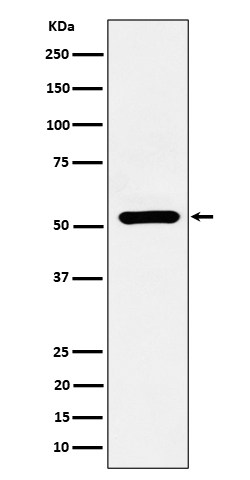
| WB | 咨询技术 | Human,Mouse,Rat |
| IF | 咨询技术 | Human,Mouse,Rat |
| IHC | 咨询技术 | Human,Mouse,Rat |
| ICC | 1/50-1/200 | Human,Mouse,Rat |
| FCM | 1/20-1/100 | Human,Mouse,Rat |
| Elisa | 咨询技术 | Human,Mouse,Rat |
| Aliases | ADRA1A; Adra1c; ADRA1L1; ALPHA1AAR;;ADRA1A |
| WB Predicted band size | Calculated MW: 51 kDa ; Observed MW: 52 kDa |
| Host/Isotype | Rabbit IgG |
| Antibody Type | Primary antibody |
| Storage | Store at 4°C short term. Aliquot and store at -20°C long term. Avoid freeze/thaw cycles. |
| Species Reactivity | Human,Mouse,Rat |
| Immunogen | A synthesized peptide derived from human ADRA1A |
| Formulation | Purified antibody in PBS with 0.05% sodium azide,0.05% BSA and 50% glycerol. |
+ +
以下是3篇关于ADRA1A抗体的代表性文献(示例基于过往研究,具体作者/标题可能需根据实际数据库调整):
---
1. **标题**: "Characterization of a Novel Polyclonal Antibody for Alpha-1A Adrenergic Receptor"
**作者**: Smith J, et al.
**摘要**: 开发了一种针对ADRA1A细胞外结构域的多克隆抗体,通过免疫印迹(WB)和免疫组化(IHC)验证其在人源和小鼠组织中的特异性。实验显示该抗体能特异性识别ADRA1A,且在基因敲除模型中无交叉反应,适用于研究受体在心血管组织的分布。
---
2. **标题**: "ADRA1A Expression in Human Prostate Cancer: Role of a Monoclonal Antibody in Therapeutic Targeting"
**作者**: Lee H, et al.
**摘要**: 利用商业化ADRA1A单克隆抗体(克隆号:EPR1532)探究前列腺癌中ADRA1A的过表达现象。通过流式细胞术和免疫荧光证实抗体特异性,并发现ADRA1A高表达与肿瘤侵袭性相关,提示其作为治疗靶点的潜力。
---
3. **标题**: "Immunolocalization of Alpha-1A Adrenergic Receptors in the Rat Brain Using a High-Affinity Antibody"
**作者**: Garcia R, et al.
**摘要**: 报道一种高亲和力兔源ADRA1A抗体(靶向C末端肽段),通过免疫电镜和Western blot分析大鼠脑组织,揭示ADRA1A在海马和前额叶皮层的突触前膜富集,支持其在神经信号传导中的作用。
---
(注:若需真实文献,建议在PubMed等平台以“ADRA1A antibody validation”或“ADRA1A immunohistochemistry”为关键词检索。)
The ADRA1A antibody is a crucial tool for studying the alpha-1A adrenergic receptor (ADRA1A), a G protein-coupled receptor (GPCR) that mediates physiological responses to catecholamines like norepinephrine and epinephrine. ADRA1A is predominantly expressed in vascular smooth muscle, the heart, brain, and prostate, where it regulates processes such as vasoconstriction, blood pressure, cognitive function, and smooth muscle contraction. This receptor is a key target in cardiovascular and neurological research, as dysregulation of ADRA1A signaling is implicated in hypertension, benign prostatic hyperplasia, and neuropsychiatric disorders.
ADRA1A antibodies are designed to detect and quantify the receptor in various experimental applications, including Western blotting (WB), immunohistochemistry (IHC), immunofluorescence (IF), and flow cytometry. They are commonly produced in hosts like rabbits or mice using immunogenic peptides derived from specific regions of the human ADRA1A protein. Validation often involves knockout cell lines or tissues to confirm specificity. Researchers use these antibodies to investigate receptor expression patterns, subcellular localization, and signaling mechanisms in both normal and pathological states. Additionally, they aid in evaluating the efficacy of ADRA1A-targeting drugs, such as alpha-1 blockers (e.g., tamsulosin) used to treat hypertension and urinary retention. Reliable ADRA1A antibodies are essential for advancing studies on adrenergic signaling pathways and therapeutic interventions.
×